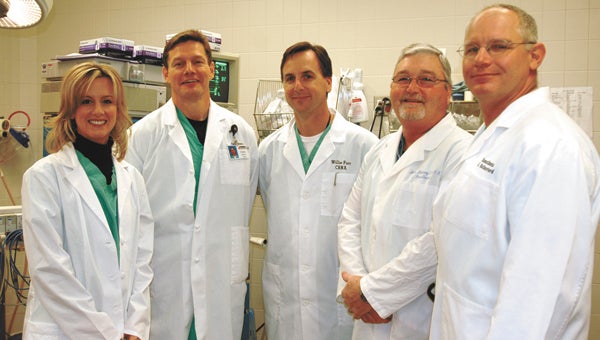Local group provides anesthesia for ARH
Published 12:00 am Friday, January 14, 2011

Michele O’Neal, Chris Blatz, Willie Furr, Mike Mabrey, and Jeffery Rutherford are members of Covingotn Anesthesia, the group who has been the sole provider of anesthesia at ARH since 1999. | Stephanie Nelson/Star-News
Some might say the most important part of the surgical process is the doctor performing the surgery; however, others might say it’s the people who administer the meds to keep patients from feeling any pain.
There are two names for those professionals – anesthesiologists and certified registered nurse anesthetists, or CRNAs.
The difference between the two is that anesthesiologists receive medical education while CRNAs receive nursing education.
CRNAs are the primary providers of anesthesia care in rural America. These health care professionals enable health care facilities in medically underserved areas to offer obstetrical, surgical and trauma stabilization services. In some states, CRNAs are the sole providers in nearly 100 percent of the rural hospitals – including Andalusia Regional Hospital.
Locally, there is a group of five such professionals – Willie Furr, Michele O’Neal, Mike Mabrey, Jeffery Rutherford and Chris Blatz – who make up Covington Anesthesia. The group has been the sole provider of anesthesia at ARH since 1999.
“CRNAs are in all rural areas of the U.S., not just in South Alabama,” Furr said. “It’s our job to carry patients through the entire surgical process. We meet in pre-op, where we discuss an anesthesia plan to determine how best to care for you. Then, we accompany you to the operating room where we administer the anesthesia.
“As a CRNA, we’re there throughout the surgical procedure, and we’re there when you start to wake up,” he said.
CRNAs administer three types of anesthesia – general, regional and sedation, he said.
“General and sedation are self-explanatory, but regional means things like epidurals,” he said.
To become a CRNA, requirements include:
• a bachelor of science in nursing (BSN) or other appropriate baccalaureate degree.
• a current license as a registered nurse.
• at least one year of experience as a registered nurse in an acute care setting.
• graduation with a minimum of a master’s degree from an accredited nurse anesthesia educational program.
• the passing the national certification examination following graduation.
In order to be recertified, CRNAs must obtain a minimum of 40 hours of approved continuing education every two years, document substantial anesthesia practice, maintain current state licensure, and certify that they have not developed any conditions that could adversely affect their ability to practice anesthesia.
“CRNAs are highly educated professionals who provide a great service to hospitals nationwide,” Furr said. “And we love what we do.”
The week of Jan. 23-29 is being celebrated as national nurse anesthetists’ week.
Established by the American Association of Nurse Anesthetists (AANA), national nurse anesthetists’ week was created to encourage CRNAs to take the opportunity to educate the public about anesthesia safety, questions to ask prior to undergoing surgery, and the benefits of receiving anesthesia care from nurse anesthetists.




